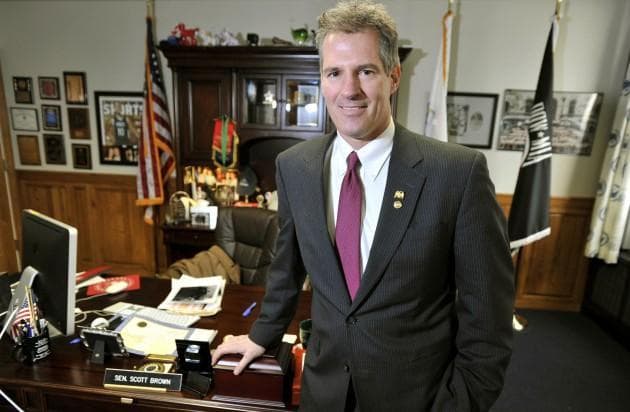Advertisement
After One Year, Brown Surprises All But Himself
Resume
One year ago, Scott Brown pulled off a stunning upset to be elected the new U.S. senator from Massachusetts, and the country suddenly woke up to the new political force of the Tea Party. But in the year since, Brown has gone from being the poster child of the Tea Party movement to its target.
In a recent interview, Scott Wheeler, executive director of the National Republican Trust, a PAC in Washington, D.C., which donated tens of thousands of dollars to Brown's campaign for 2010, told WBUR that he is now actively seeking a candidate to challenge Brown in the primary in 2012.
To many members of Brown's conservative base, including Herbert Yakus of South Weymouth, the senator has not turned out to be the man they thought he was. Sitting by the window at a coffee shop near his home on a recent afternoon, Yakus, a World War II veteran, had a message he wanted to share directly with the senator.
"He’s been walking a tightrope. If he goes too far right, he fears losing the general election. If he goes too far left, he fears losing his conservative base."
Todd Domke, Republican analyst
"I think Mr. Brown, I think you're a nice guy and I think you understand a lot," he said. "You talked pretty good before you got in, but all of a sudden you've backed down. Something scares you — I don't know if it scares you, but something's making you weaker in your thoughts — you're not strong."
That's pretty much the way Republican political analyst Todd Domke sees it, too — that Brown hasn't turned out to be the strong political force that his supporters expected.
"The expectations were so unbelievably high for Scott Brown going in," Domke said. "He was the David who had beaten the Goliath in a one-party state. He became a Republican rock star just by winning. But the expectations were frankly just too high."
Instead of going to Washington and shaking things up, Domke said Brown went to Washington and blended in.

"He's sort of trying to emulate what Hillary Clinton did when she went into the Senate as the former first lady," he said. "Everyone expected her to use her star power and her celebrity, instead she was more studious, more low-profile and trying to earn clout in the Senate in a low-key way."
Beyond that, Brown has taken several key votes that did not sit well with many conservatives. Most notably, he compromised with Rep. Barney Frank (D-Mass.) on the congressman's Wall Street overhaul, earning him the warm praise of the bill's co-sponsor, Sen. Chris Dodd (D-Conn.).
Interestingly, it seems to be those very things that infuriate his more hard-nosed supporters that contribute to what is Brown's popularity among voters as a whole.
"He's one of the most popular politicians in the country," said Tom Jensen, director of Public Policy Polling in Raleigh, N.C. "And most of the other folks who are at the top of that list are Republicans in really Republican states or Democrats in really Democratic states."
Jensen said Brown's popularity is all the more remarkable given the polarized political climate in the country.
"Brown, what he did during the campaign was amazing and he hasn't slipped at all over the last year," Jensen said. "He's just as strong as he was a year ago — even after he's had to deal with so many hot-button issues, he's stayed on the right side of public opinion."
"We have to give him a break and we have to give him a chance, because he's still a freshman, he's still in the middle of finding his way.”
Jennifer Nassour, Massachusetts Republican Party
Still, analysts say the challenge for Brown, if he is going to win re-election in 2012, is not staying on one side or another, but finding a way to stay on the line.
"He's been walking a tightrope," said Domke. "If he goes too far right, he fears losing the general election. If he goes too far left, he fears losing his conservative base of volunteers and donors.
"It's difficult. He'll fall off that tightrope sometimes, as he did in the midterms, where the state GOP had a wipe-out and showed that, as popular as he is, he doesn't have coat tails."
It was thought that Brown's coat tails would help carry Republicans like candidate for governor Charlie Baker and congressional candidate Jeff Perry in the midterm elections. But it didn't happen. Massachusetts voters gave Deval Patrick another four years as governor and put Democrats back in all 10 congressional seats.
But analysts say that's not necessarily a sign of Brown's weakness, it may just be further evidence that he's one of those rare politicians who is elected because people like him, not because they like his party.
Which is why, even if she doesn't always agree with his choices, Massachusetts Republican Party Chairwoman Jennifer Nassour thinks Brown is the best shot she has at keeping a Republican in Washington in 2012.
"He’s got to realize who put him in there. This was an uprising, this was to send a message, and he hasn’t sent that message yet.”
Herbert Yakus, Brown supporter
"We have to give him a break and we have to give him a chance, because he's still a freshman, he's still in the middle of finding his way," Nassour said. "But at the end of the day, 80 percent, 90 percent of voting how we wanted him to vote when we elected him -- not so bad."
But some conservatives think it is so bad. Scott Wheeler, of the National Republican Trust, used to be one of Brown's biggest supporters. Now, he's written an essay titled "Why Scott Brown Must Be Defeated." He says Brown's support of the New START arms treaty with Russia was the last straw. Wheeler is actively in the field looking for a candidate to challenge the senator in the GOP primary election next year.
"I would look at the Arlen Specter model," Wheeler said. After the Pennsylvania senator voted for the stimulus bill in 2009, Wheeler and other right-leaning Republicans vowed to defeat him. Seeing the Republican polls, Specter switched parties, lost the Democratic party and is now out of the Senate.
"So I see Brown following a similar pattern," Wheeler said, "and we're more than happy to help him go the way of Arlen Specter."
Back at the coffee shop in South Weymouth, Herbert Yakus said he hasn't given up on Brown yet. But he needs to see a sign in the coming year that his senator is still the same truck driving, barn jacket wearing guy from Wrentham that he was a year ago.
"We're more than happy to help him go the way of Arlen Specter.”
Scott Wheeler, Tea Party leader
"He's got to realize who put him in there," Yakus said. "This was an uprising, this was to send a message, and he hasn't sent that message yet."
Sending that message will be Brown's challenge on the Republican side. Asked to comment on Wheeler's threat, a spokesman for the senator said only that Brown is focused on his job and on restarting the economy.
On the Democratic side, the list of potential candidates is already taking shape and it includes names like Rep. Michael Capuano (D-Mass.) and City Year founder Alan Khazei, who both seem to want another go at Brown after losing to Massachusetts Attorney General Martha Coakley in the Democratic primary last year.
So, at the end of his first year, Brown has turned out to be exactly who he said he was — a Scott Brown Republican. In 2012, it will be up to voters to decide if they are members of his party.
This program aired on January 26, 2011.